The publications listed here report research carried out by The Shyness Institute. The Shyness Institute is a non-profit research institution dedicated to research regarding shyness, social anxiety, and related anxiety disorders.
A central focus of this work is the development of The Social Fitness Model, which views capabilities in demanding social situations as analogous to capabilities in demanding physical situations: one needs to get and remain fit if one expects to be able to function. Social fitness is achieved through practice.
Note: These documents are in PDF format. You can download a free PDF viewer at Adobe
2021
- New workbook: The Shyness Workbook: Take Control of Social Anxiety Using Your Compassionate Mind. Lynne Henderson (2021):

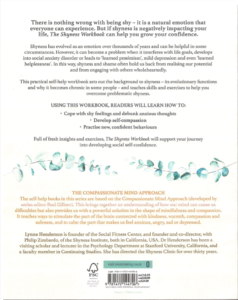
2017
- Compassionate Social Fitness: Implications for an Extreme Type of Male Shyness and WithdrawalCompassionate Social Fitness for All. Henderson, L, panel presentation, August 5, 2017, American Psychological Association, Conference, Washington, DC, USA.
2016
- Compassionate Social Fitness for All. Henderson, L, presentation, July 10, 2016, Summer Forum, Unitarian Universalist Church of Berkeley, Kensington, CA, USA.
- Compassionate Social Fitness for All. Henderson, L, presentation, November 7, 2016, Albany Y, Albany, CA, USA. [watch on YouTube]
2015
- Compassionate Social Fitness: Theory and Practice. Henderson, L, workshop April 11, 2015, Anxiety and Depression Association of America conference – ADAA 2015, Miami, FL, USA.
- Compassion-Focused Therapy for Shyness and Social Anxiety Disorder: Compassionate Social Fitness. Henderson, L, Course, John F. Kennedy University, September 26, 2015, Berkeley, CA, USA.
- Compassionate Social Fitness for All. Henderson, L, Keynote Address, November 5, 2015, Norwegian Association for Cognitive Therapy Conference, Oslo, Norway.
2014
- New book: Helping your Shy and Socially Anxious Client: A Social Fitness Training Protocol Using CBT. Lynne Henderson, Ph.D, (2014):
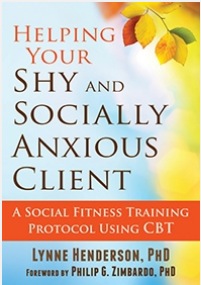
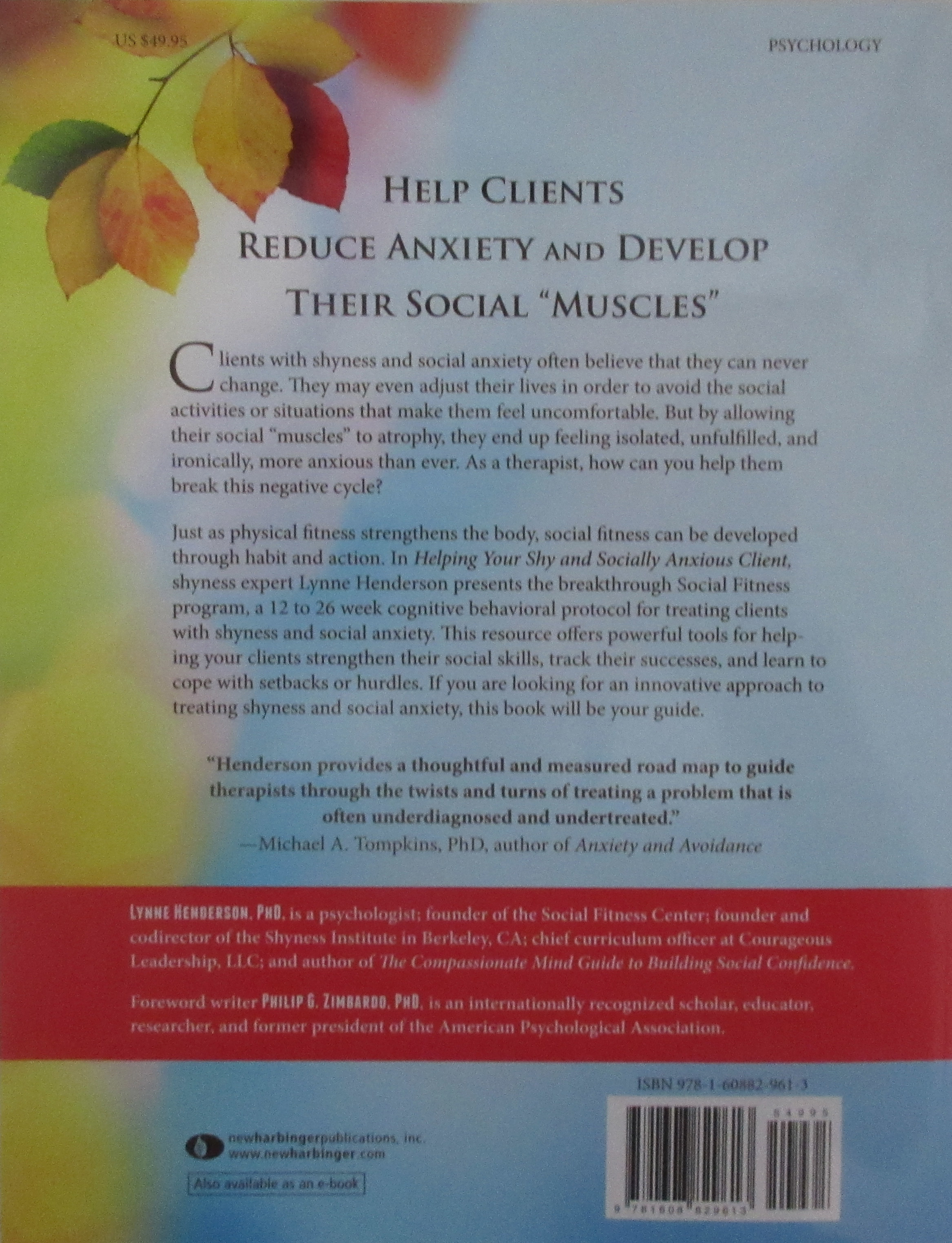
- Compassionate Social Fitness: Theory and Practice. Henderson, L, workshop March 29, 2014, Anxiety and Depression Association of America conference – ADAA 2014, Chicago, IL, USA.
- Shyness and social anxiety. Henderson, L., Gilbert, P., & Zimbardo, P. (2014, in press; draft – do not cite). In S. G. Hofmann & P. M. DiBartolo (Eds.), Social anxiety: Clinical, developmental, and social perspectives, third edition (3rd ed.). Taramani, Chennai,India: Elsevie.
- Compassionate Social Fitness: Theory and Practice. Henderson, L, workshop March 29, 2014, Anxiety and Depression Association of America conference – ADAA 2014, Chicago, IL, USA. [presentation (.pptx) and handout – 6 slides per page (.pdf)]
- Compassionate Social Fitness: Theory and Practice. Henderson, L, workshop May 9, 2014, Monterey Bay Chapter of CAMFT, Monterey, CA, USA. [presentation (.pptx) and handout – 6 slides per page (.pdf)]
2012
- Compassionate Social Fitness: Theory and Practice. Presentation given at the 2012 ADAA Conference.
2011
- The Compassionate-Mind Guide to Building Social Confidence: using compassion-focused therapy to overcome shyness & social anxiety, by Dr. Lynne Henderson, published in the US by New Harbinger Publications. (This book is currently out-of-print. Click here for a pre-publication draft.)
-
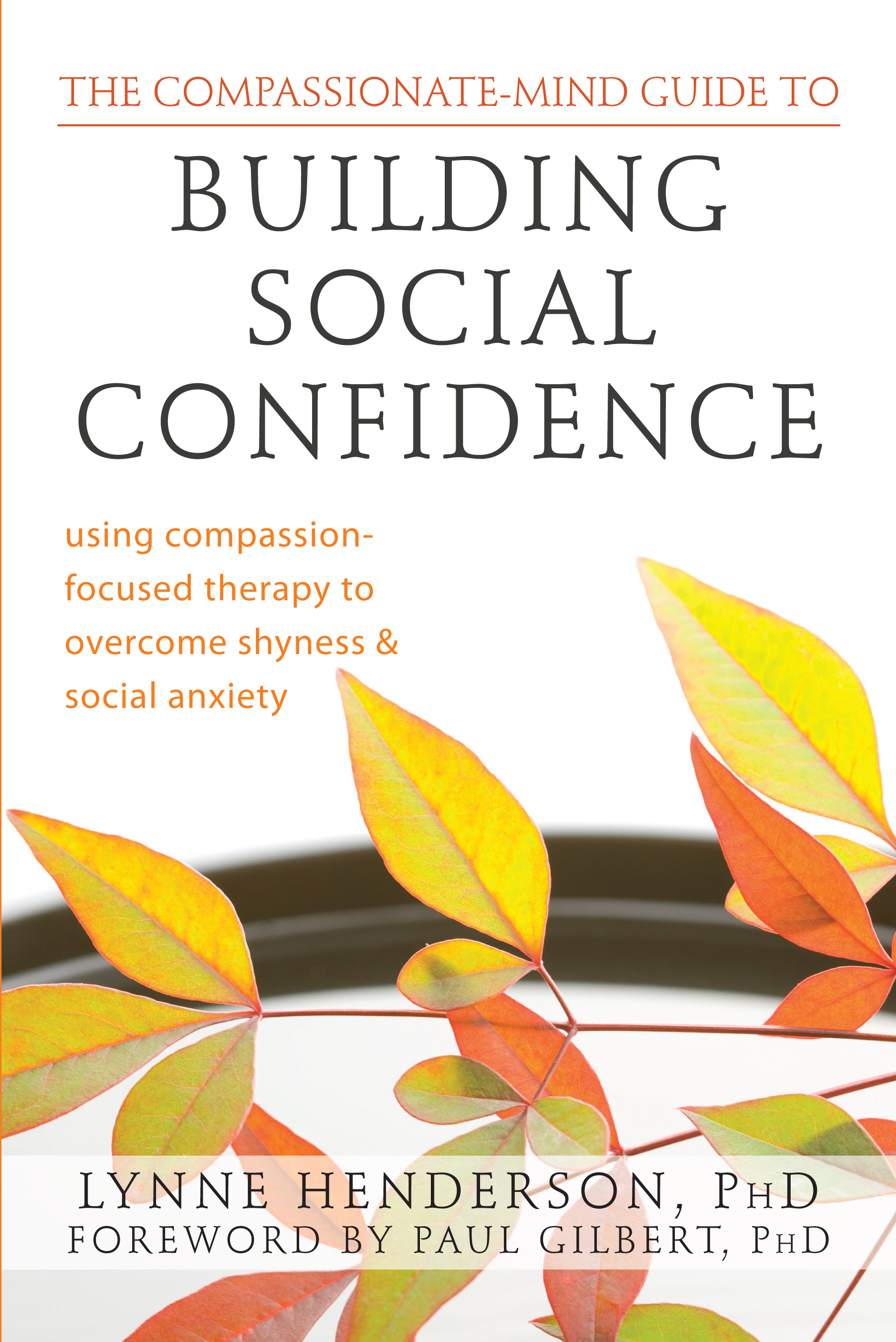

- Social Fitness: The Online Treatment of Shyness. Abstract of results of online study.
2010
-
- Improving Social Confidence and Reducing Shyness Using Compassion Focused Therapy, by Dr. Lynne Henderson, published in the UK by Little, Brown (Constable & Robinson).
 |
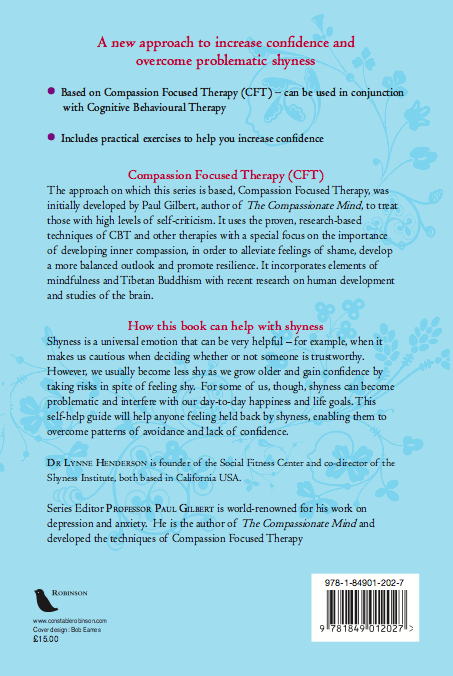 |
- ShyQ. Poster given at the ABCTconference, San Francisco, CA.
- Shyness, Social Anxiety and Social Phobia, Henderson, L., & Zimbardo, P. (2009, in press; draft – do not cite). In S. G. Hofmann & P. M. DiBartolo (Eds.), Social anxiety: Clinical, developmental, and social perspectives, second edition (2nd ed.). Taramani, Chennai,India: Elsevier.
- Testing Treatment Fit Among Social Phobic and Shy Patients: In Search of Specific Treatment Effects, Kimpara, S., Henderson, L., & Beutler, L. E. (2010, Doctoral dissertation). The effectiveness of the integrative approach incorporated into the Social Fitness Training was mediated by level of internalizing coping style.
2009
- ShyQ. Poster given at the Connecticut Psychological Association meeting.
- Social Fitness: Theory and Practice. Presentation given at the Connecticut Psychological Association meeting.
2007
- Shyness and Communal vs. Individualistic Orientations: Sensitivity to Emotion. Poster presented at ABCT.
2006
- APA Shyness brochure. A waitingroom brochure, prepared for the “Talk to someone who can help” series of the American Psychological Assocation.
- Social Fitness: Theory and Practice. Paper presented at Kaiser Permanente, March 27, 2006
- Social Fitness: Theory and Practice. Paper presented June 29, 2006
- Social Allergens and Frustrated Interpersonal Motives. with Leonard Horowitz. Paper presented at the Society of Interpersonal Theory and Research, June, 2006
- Supporting Distance Meetings. Social skills in distance meetings with Austin Henderson, May, 2006
- Gifted and shy. In Duke Gifted Newsletter.
2005
- From quiet rage to quiet revolution. Paper presented at the Western Psychological Association, 85th annual meeting, Portland, Oregon
- Social allergies and frustrated interpersonal motives. Paper presented at the Society for Interpersonal theory and research, 8th Annual Meeting, Montreal, Canada.
2003
- Shyness and Self-Preoccupation: Effects on Conversation Partners Poster presentation at the American Association of Behavior Therapy, November, 2003.
- Perceptions of Facial Affect in the Shy and the Not-shy Poster presentation at the American Association of Behavior Therapy, November, 2003.
- Shame and Anger in Chronic Shyness and Social Anxiety Disorder unpublished paper.
2002
- Participation, Trust and Distance Collaboration Slides from a presentation at the University of Michigan, February, 2002.
- Measuring the Dimensions of Shyness: SHYQ Slides from a presentation given at the Conference of the Western Psychological Association, San Diego, April, 2002.
- The Shy Q, a Measure of Chronic Shyness: Associations with Interpersonal Motive and Interpersonal Values Handout from a poster presented at the Society for Interpersonal Theory and Research, May, 2002.
- Shyness and Self-Preoccupation Effects on Conversation Partners Slides from a presentation at the Society for Interpersonal Theory and Research, May, 2002.
- Shyness and College Admissions (slides).
- Social Fitness and Technical Use: Adolescent Interview Study (unpublished paper).
- Comparing Social Fitness and Technology Use at the High School and College Level (unpublished paper).
- The Shy Q, a Measure of Chronic Shyness: Associations With Interpersonal Motives, Interpersonal Values and Self-Conceptualizations. Handout from a poster presentation at American Association of Behavior Therapy, November, 2002.
2001
- Research Report: The Henderson/Zimbardo Shyness Questionnaire: a new scale to measure chronic shyness
- Research Report: Social Fitness Training, Restructuring Self-blaming Attributions and Reducing Shame: Preliminary Data
- Journal Article: Banerjee, R., & Henderson, L. (in press). Social-cognitive factors in chilldhood social anxiety: a preliminary investigation.Social Development.
- Journal Article: Henderson, L. (in press). Fearfulness predicts self-blame and shame in shyness. Personality and Individual Differences.
- Book Chapter: Henderson, L., & Zimbardo, P. (2001a). Shyness as a clinical condition: The Stanford Model. In L. Alden & R. Crozier (Eds.), International Handbook of Social Anxiety . Sussex, England: John Wiley & Sons.
- Book Chapter: Henderson, L., & Zimbardo, P. (2001b). Shyness, social anxiety and social phobia. In S. Hofmann & P. di Bartolo (Eds.), From social anxiety to social phobia (pp. 46-64). Needham Heights: Allyn & Bacon.
2000
- Research Report: Shyness and Technology Use in High School Students
- Research Report: Social Anxiety, Negative Emotion, and Social Cognition in Children: Results of Social Skills Groups
- Journal Article: St. Lorant, T., Henderson, L., & Zimbardo, P. (2000). Co-morbidity in a shyness clinic sample. Depression and Anxiety, 12, 232-237.
- Journal Arcticle: Hayward, C., Varady, S., Albano, A. M., Thienemann, M., Henderson, L., & Schatzberg, A. F. (2000). Cognitive-behavioral group therapy for social phobia in female adolescents: Results of a pilot study. Journal of the American Academy of Child and Adolescent Psychiatry, 39(6), 721-726.
1999
- Magazine article: CPA Magazine
- Paper: Comorbidity in Shyness Clinic Clients
- Article in: Encyclopedia of Psychology and Neuroscience
- Conference paper: Society for Interpersonal Theory and Research 99
- Henderson, L., Discussant Comments: Social Fitness Theory, APA, Boston, MA, 19999
1998
- Conference Paper at APA 1998: Trouble in River City: Shame and Anger in Chronic Shyness
- Henderson, L., & Zimbardo, Philip. Shyness. Encyclopedia of Mental Health. San Diego: Academic Press.
1997
- Journal paper: MMPI Profiles of Shyness in Clinic Patients, Psychological Reports, v80, pp 695-702. (abstract)
- Social Fitness Training with College Students, Lynne Henderson, Alejandro Martinez, Philip Zimbardo, Stanford University, USA; International Conference on Shyness and Self-Consciousness, Cardiff, Wales, UK; July 16,1997
1996
- Henderson, L., & Zimbardo, P. (1996). Shyness and control: Behavior? Impression on Others? “Second Effort?” Paper presented at the annual meeting of the Anxiety Disorders Association of America, Orlando, Florida.
1995
1994
- Henderson, L. (1994). Differentiating self-blame in a high school sample. Paper presented at the annual meeting of the Anxiety Disorders Association of America, Santa Monica, California.
1993
1992
- Henderson, L. (1992). Self-blame and shame in shyness. Dissertation Abstracts International (University Microfilms).
- Henderson, L. (1992). Mean MMPI profile of shyness clinic referrals. Paper presented at the 26th annual meeting of the Association for Advancement of Behavior Therapy. Boston, Massachusetts. (in revision for Psychological Reports)
- Henderson, L. (1992). “Shyness Groups” in M. McKay & K. Paleg (Eds.), Focal psychotherapy groups. Oakland: New Harbinger Publications.
The publications listed here report research carried out by The Shyness Institute. The Shyness Institute is a non-profit research institution dedicated to research regarding shyness, social anxiety, and related anxiety disorders.
A central focus of this work is the development of The Social Fitness Model, which views capabilities in demanding social situations as analogous to capabilities in demanding physical situations: one needs to get and remain fit if one expects to be able to function. Social fitness is achieved through practice.
Note: These documents are in PDF format. You can download a free PDF viewer at Adobe
